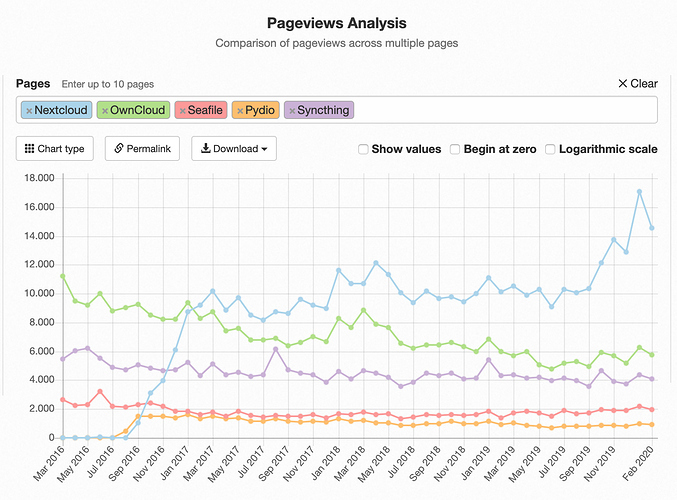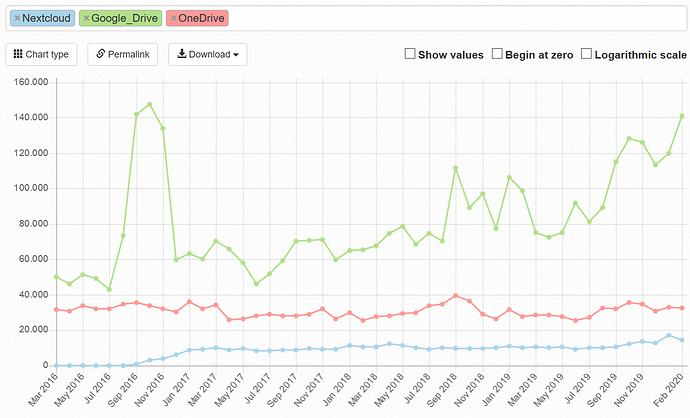Originally published at: Nextcloud doubles order intake and customer base, remains profitable and independent - Nextcloud
#onhover {
display: none;
}
#trends:hover span[id=“initial”] {
display: none;
}
#trends:hover span[id=“onhover”] {
display: block;
}
Release of Hub set to accelerate pace for market leader in on premise content collaboration market
Nextcloud closed 2019 with record numbers, increased its growth rate further, doubling order intake last year and doubling its customer base for the 3rd year in a row. The business maintained profitability and financial independence using an organic growth strategy. The higher expansion rate was fueled by increased security awareness and a growing movement to bring back critical business applications on premises. The release of Nextcloud Hub in January 2020 to glowing reviews in the press immediately doubled incoming lead flow, emphasizing the interest in the new capabilities it delivered and setting the stage for continued growth in the new year.
Accelerating growth thanks to supporting industry trends
The explosion of SaaS services employed in organisations overloads IT departments and increases business, security and compliance risks. Awareness of this problem has caused a push towards consolidation. As part of that, security has become the central factor impacting cloud strategies in enterprises, and amidst disappointing benefits of the move to the cloud and hybrid cloud considered the ‘ideal’ IT operating mode by over 80% of businesses, studies show that almost three-quarter of mid-size and large enterprises are migrating one or more applications away from the public cloud and back on premise. The Nextcloud app platform, with well over 200 apps providing extensive collaboration and communication capabilities, is perfectly positioned to benefit from these trends. Nextcloud offers enterprises a way to cut down on the amount of different SaaS services while hosting the platform under their control.
The industry trends supports accelerating Nextcloud growth, with businesses in need of more modern collaboration technology but security risks and compliance regulations resulting in migrations back to on premise or local, managed cloud providers
said Jos Poortvliet, head of marketing at Nextcloud GmbH.
Based on the first months of 2020, we expect to double our sales again and we plan to expand our team significantly to meet customer demand while remaining profitable and independent from external investments.
added Andreas Rode, head of Sales at Nextcloud GmbH.
Among strong demand in the public sector in Germany, Nextcloud also opened a second office in Berlin during 2019.
Expanding range of customers
Nextcloud accelerated its sales growth, signing twice as many new customers in 2019 as during 2018. 179 new enterprises and government organisations from Australia, Asia, Africa, Europe and the Americas joined the existing customer base, more than doubling its size. Besides over 100 organisations in a wide variety of industries from finance and insurance to transportation and engineering, about 30 universities and research institutes, more than 15 local and federal government agencies and a dozen health and hospital institutions joined as new customers.
Financially, Nextcloud shows healthy and sustainable growth. 2019 was closed with a significant profit, and the increase in growth rate and strong sales results of the first 2 months position Nextcloud well for an equally successful 2020.
Despite significant investments in product development, Nextcloud GmbH is closing the year with a profit. A strong product roadmap focused on meeting the needs of customers, combined with excellence in engineering and support pays off with strong but sustainable, organic growth.
noted Nextcloud GmbH managing director Frank Karlitschek.
Fast growth of user base
Nextcloud is increasing its lead on the competition in the on premise file sync and collaboration market. Statistics show the Nextcloud server installed base again grew by 50% over 2019, with monthly server downloads growing from 100.000 in 2019 to 250.000 early 2020. The pace is accelerating: the Nextcloud Hub release alone grew the download rate by 250%. Hub had 150.000 downloads in under 6 weeks, with downloads of previous releases increasing as well.
The official Nextcloud Docker image crossed the 100M pulls threshold early 2019 and the Nextcloud Desktop client release recently exceeded 100.000 downloads in a single day. A similar trend is visible with downloads and ratings on app stores, with an iOS app rating of 4.7 from 3.4K reviewers and the Android app exceeding the 500K user mark, unique in the on-prem collaboration market. At the very popular Ubuntu Snap Store, Nextcloud maintains its ranking as the number one server application with over 36K active installations, a 50% growth compared to a year ago. Popularity on NAS devices is also growing, with the QNAP store showing over 50.000 active installations.
Google trends shows search interest in Nextcloud averaging 3x over its closest competition. With over 2500 code contributors over its lifetime and 700 in the last year, Nextcloud is the largest self-hosted productivity suite in terms of contributor base.


About Nextcloud
Nextcloud Hub is the industry-leading, fully open source, on premise team productivity platform, combining the easy user interface of consumer-grade cloud solutions with the security and compliance measures enterprises need. Nextcloud Hub brings together universal access to data through mobile, desktop and web interfaces with next-generation, on premise secure communication and collaboration features like real-time document editing, chat and video calls, putting them under direct control of IT and integrated with existing infrastructure.
Nextcloud’s easy and quick deployment, open, modular architecture and emphasis on security and advanced federation capabilities enable modern enterprises to leverage their existing file storage assets within and across the borders of their organization. For more information, visit nextcloud.com or follow @Nextclouders on Twitter.
Links
- Public financial information on Nextcloud
- Ubuntu Store for server and cloud
- Report on cloud usage survey at 2,650 mid and large size companies concluding 85% considers Hybrid to be idea model and 73% is migrating one or more applications back on premise
- Issues with data silos and exploding use of SaaS services
- European governments deploying Nextcloud
- RENATER deploying Nextcloud for French universities and research institutes
- Partnership with IONOS
- Announcement of Nextcloud Hub
- Official press release


 )
)